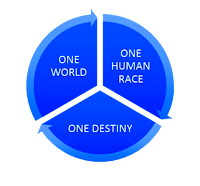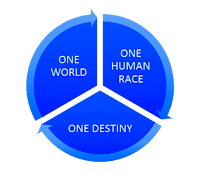WHAT MOTIVATES PEOPLE - THE BASICS!
Strong protection - Castle in Wales -UK
We are, of course, all motivated by our basic needs, such as the need for food, warmth, shelter, good health, and protection from dangers, whether from our fellow humans, dangerous animals, or from environmental hazards. From this, it can been deduced that our basic needs are our most important motivators, which is something we have in common with probably every other living animal. This motivation to meet or have our basic needs satisfied, is really the expression of our need to survive; both as individuals, families, ethnic groups, and, at a macro level, as a specie. Which, again, is probably no different from any other living organism. The apparent, although probably not proven difference between human beings and other higher order primates, and, say, those animals which are not given to demonstrating their intellect the way human beings do, is that we have tended to attribute the expression of intelligence or conscious thought in the 'lower order' animals to concepts such as 'instinct' or 'imprinting.' In other words, a kind of 'primitive intelligence' which motivates living creatures to do what is essential for their survival, but which humans, as opposed to all or most other creatures, has developed and evolved to the extent where they have become ergo sum, (Rene' Descartes' "I think, therefore I am.") and is able to transform their internal and external environment in a dramatic way that no other animals have been known or capable of doing.
Of course, many of us will be aware that there are other animals that think, if we ascribe their vigilant watchfulness and awareness of danger, or their use of tools to facilitate their provision of food or 'shelter', as expressions of 'intelligence' and self-awareness.
But, I digress, so let us leave further exploration of that for another time.
The meeting of our basic needs is clearly an essential requirement which all of us have to satisfy, before we can progress up the ladder of more complex needs. Considering what I have said about the link between basic needs and the survival of the specie humanus, in this case, it makes sense to briefly consider home ancient humans organised themselves into families, tribes, alliances, and nations, to make themselves stronger and meet their basic needs. We can see that, after a family or tribe has become self-sufficient in, say, growing crops or raring livestock to feed and clothed themselves, they are then able to barter or sell the excess to help to meet other basic needs which they are not yet able to meet sufficiently. Thus we have a motive for establishing and developing trade between people, which, in itself, can help to meet the parties' basic need for self-protection, if we hypothesise that you would want to avoid making war with the people who are helping to feed and clothed you. Of course, there would be times when some tribes would actually be motivated to make wars on other people because of the incentive to rob them of their food and livestock.
Moving forward to the present, people generally do not have to come together in groups in order to meet their basic needs, although one could see trade unions, producers' and trade organizations as being akin, in some ways, to how ancient humans might have organised themselves. The nuclear family is the basic societal unit of organization for meeting people's basic needs. Accordingly, once parents take on the responsibility of having children, their primary motivation become that of caring for their children; by way of meeting all their needs. This motivation to meet their children's needs, will determine or greatly influence how they participate or continue to participate in the different socio-economic, familial and political systems which impact upon their lives. in general and at particular stages in their children's developmental stages. Whereas the parents or carers will be motivated by the tasks they have to pursue or complete to fulfil their caring/parenting roles, the children, depending on their ages, will have different societal and family specific needs which they have to meet, in order to ensure the survival of the their society, and the specie, by preparing themselves to takeover from their parents and other adults.
Of course, if our primary or innate motivation is to meet our basic needs, including the need to ensure the survival of our specie, then, what happens when it takes only a small proportion of the time it had previously taken us meet these needs? Does it allow us to create, evolve 'new needs', as opposed 'wants', or are 'basic needs' now being defined according to people's socio-economic status, and which part of the world they are living in?
I would like to come back to this at some point.
More time for creativity and leisure?
OWOHROD






Comments